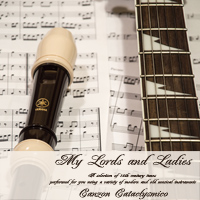
My Lords and Ladies
Here are details of all 12 tracks. Please listen to them all here at Bandcamp or here at CDBaby.
The Earle of Essex Galiard
Composer: John Dowland (1563-1626)
The second in this series. What I enjoyed about this one is the time changes - there's 6 crotchets to a bar, but some have a 3/4 feel and some a 6/8 feel. As with the others in the series, there's a mix of real instruments, midi (via keyboard controller) and midi (programmed). This was my first go at notating a drum score.
Lady Hudson's Puffe
Composer: John Dowland (1563-1626)
I wanted to do a Status Quo type thing and this Dowland piece lent itself really well. The original piece is a really enjoyable listen when played on classical guitar
A New Courtley Sonet of the Lady Green Sleeves
anon / attributed to King Henry VIII, this arrangement Richard Jones
So much of this early music is in 3 or 6 (or a mixture, see my Earl of Essex Galiard) but for a rock feel you want to tend towards 2 or 4. Happily this arrangement of Greensleeves is authentic, it's from Richard Jones's 'A Handfull [sic] of Pleasant Delites [sic]' from 1584 and it is genuinely a 2/4 arrangement of Henry VIII's classic hit. Parts for harp, synth etc were shoehorned in by yours truly.
Lord Willoughby His Welcome Home
Composer: John Dowland (1563 -1626)
I'm surprised that this is in a minor key given the title (maybe Lord Wolloughby was welcomed home under slightly sombre circumstances). [edit - he was returning from war]. It's a fabulous tune and I appreciated it more, the more I played it.
My Lord Zouche's Masque
Composer: anon 16th century with original additions
As with all of the pieces in this project. This is 16th century music, with reference to original manuscript where possible along with other people's edits and original parts added in..
Jesters' Dance (Danse des bouffons)
Composer: Thoinot Arbeau, Pierre Phalese
This is a very repetitive piece, originally accompanied a dance (using swords and shields). It's interesting to see how many ways you can vary a tune. I must note reference to the sheet music "Monsieur Arbeau's School of Dancing" a recent arrangement by Sven Berger, who in turn references Arbeau and Phalese.
Madrigal - The Lady Oriana
Composer: John Wilbye (1574 - 1638)
There were some nice opportunities in the sheet music to add some style and tempo changes, Credit to John Wilbye (1574 - 1638) for the music, I guess he didn't expect to hear it played using instruments that weren't invented when he was alive. I hope he'd approve.
The Earl of Salisbury's Pavane
Composer: William Byrd (1539 - 1623)
A beautiful (if short) tune, it makes a nice 'middle movement' in a suite of 16th century tunes, or maybe a nice slow departure in the middle of an album like this. I played flugelhorn on this recording, along with the guitars and other things. It's nice to be able to play brass again after an accident involving my lip and teeth earlier in the year. I'd love to play this on cornetto rather than flugel, but it'll take a bit more time to become proficient enough on that difficult instrument.
Lady Laiton's Almain
Composer: John Dowland (1563-1626)
Some of these tunes are very simple and leave you free to experiment with styles, tempi etc. I love a bit of ska but have never really played any before. It gives me the opportunity to play a bit of brass, and it blends well with the straight rock sections.
The Lady Frances Sidney's Felicitye
Composer: Daniel Bachiler (1570-ish - 1610-ish)
The Lady Frances Sidney must have been a popular lady with the composers. I've already hacked at Lady Frances Sidney's Goodnight by John Dowland. This on is by Daniel Bachiler (1570-ish - 1610-ish) - a new name to me and a good piece, allowing for some varied styles. I don't know what Felicitye means, maybe it's a type of musical piece or maybe it's the name of Lady Frances' daughter. The reference to Avenged Sevenfold in the final guitar solo is entirely intentional.
Lord Rendal
traditional balad, this draws on an arrangement by Granville Bantock, 1868 - 1946
A little different from the others on this album, the tune and arrangement are later than 16th century (the arrangement I've used is by Granville Bantock, a Victorian gentleman). Versions of the ballad itself (Lord Randal / Randall / testament or will of the poisoned man) allegedly go back to the 17th century (seemingly with a very different tune).
The Lady Frances Sidney's Goodnight
Composer: Richard Allison (1592-1606)
Goodnight!